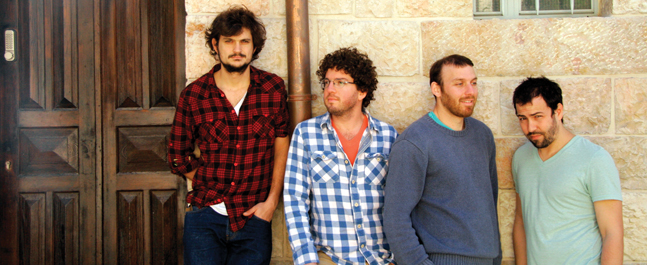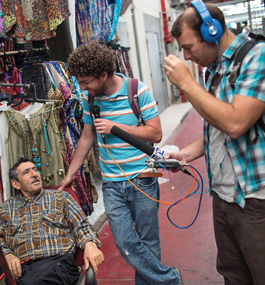This Israeli Life

Courtesy Roee Gilron
SOUND MEN: "Israel Story" creators, from left, Yochai Maital, Mishy Harman, Roee Gilron and Shai Satran.
by Beth Kissileff, P'18
Podcasts are “a big humanizer,” says Roee Gilron ’09, and he should know. Gilron and three of his childhood friends are the masterminds behind “Israel Story,” a podcast presented in both English and Hebrew, which has gotten Israeli and American listeners hooked on quirky/sad/joyous slice-of-life stories about totally amazing, completely ordinary folks.
If you’re thinking “This American Life,” you’ve got the right idea. Like that audio pioneer, “Israel Story,” first broadcast in Israel in 2012, lets audiences “strip away a lot of internal prejudice” and enter someone else’s world “with just a voice to go on,” Gilron says.
“Israel Story” topics range from a “redneck” retired Israel Defense Forces (IDF) lieutenant colonel who raises water buffalo for milk in rural Wisconsin. A bird “hitman” who has taken out thousands of overly aggressive crows in and around Eilat. Two residents of a countercultural religious community in Israel, married for 37 years, who are facing the husband’s terminal cancer diagnosis with humor and grace. “The podcast showcases Israelis you don’t see on TV or in the national media: regular people with interesting stories,” Gilron says.
Occasionally, the episodes are themed, like the one that explored the 10 how-to questions most asked on Google in Israel. One of the questions prompted an interview with seventh-graders eager to learn how to French kiss, a query many of their peers take to Google instead of to family members or friends. Another how-to piece revolved around arranging a sick day off in the IDF.
Getting into people’s heads is truly a calling for Gilron, who expects to complete a PhD in neuroscience at Tel Aviv University next October. “Authors and neuroscientists try to answer the same questions about the mind with different tools,” he says. “They both ask the questions ‘Why do we do what we do?’ and ‘What drives us?’”
Fittingly for someone who makes connections through stories, Gilron’s particular area of study in neuroscience concerns the neural components of “the way you understand where you begin and where someone else starts,” he says.
Gilron began his neuroscience studies as an undergraduate at Brandeis, which he entered after completing his military service in Israel. Hoping to experience a lot of diversity in America, but not entirely sure that’s what he’d find at Brandeis, he was pleasantly surprised by university life. His best friends included a home-schooled student from Iowa and an accomplished pianist from South Korea. Gilron says he also got to know Israelis he never could have met in Israel, including a Christian Arab from Jaffa with whom he has stayed in touch. Most important, he met his wife-to-be, Tiffany Roberts ’10. The couple married in 2014 in two ceremonies — the first in Israel and the second in Sonoma County, Calif., where the bride grew up.
While at Brandeis, Gilron made a point of cultivating his humanistic bent. He credits Janet McIntosh, associate professor of anthropology, with teaching him “the craft of observing closely.”
McIntosh remembers Gilron as “a brilliant student and a phenomenally good writer, fascinated by many things. He would wrestle with the tensions between cross-cultural differences and universalizing claims about human nature. He’s deeply interested in the human condition, and he has an abiding respect for how different the world can look to different people. It makes perfect sense that he is story gathering now.”
Angela Gutchess, a psychology faculty member who was Gilron’s honors thesis adviser, says, “Roee’s curiosity and enthusiasm made it fun to talk about ideas for his thesis and make sense of the data. I’m not surprised he has found a way to develop his broad interests in a creative way that has at its heart a fascination with people and their stories.”

Pavel Wolberg/The New York Times
TALK OF THE SHUK: Harman and Gilron chat with locals at the flea market in Jaffa.
page 2 of 2
Gilron met his fellow “Israel Story” creators Mishy Harman (who serves as the podcast’s host), Yochai Maital and Shai Satran when they were kids in the Noam youth movement of Masorti Judaism (the analog to America’s Conservative movement). All four are children of American immigrants to Israel who work in academia. Roee’s father — Jack (Gilberg) Gilron ’74, P’09 — is also a Brandeis grad.
Roee started listening to podcasts at Brandeis as something to do while folding laundry or working out on a treadmill, quickly becoming a believer in the power of the form. He convinced first Harman and then Maital and Satran that creating a podcast was a project worth tackling, as a way of giving Israelis and non-Israelis “a way to hear something about Israel that you don’t hear anywhere else,” he says.
“Podcasts,” he continues, “have this ability to transport you to another world, in the way a really good book does.” Or a really good movie. According to an article in Haaretz in July, Steven Spielberg is an “Israel Story” funder. Apparently, he thinks it spins captivating yarns. And he should know.
Beth Kissileff is a freelance journalist. Listen to episodes of “Israel Story” online at en.israelstory.org. The second English-language season (which is the third Hebrew-language season) will be available in the coming weeks.
